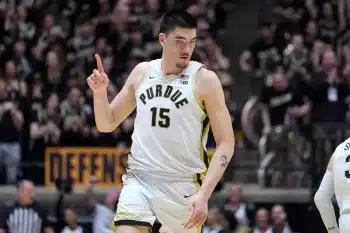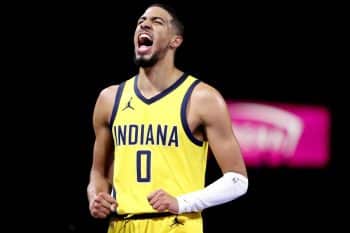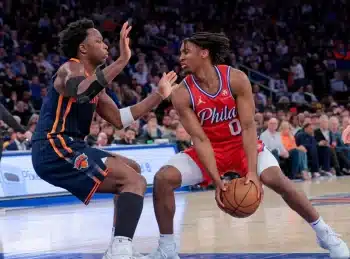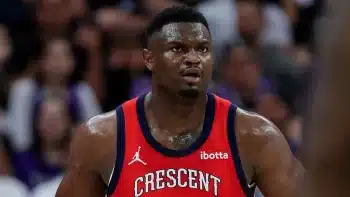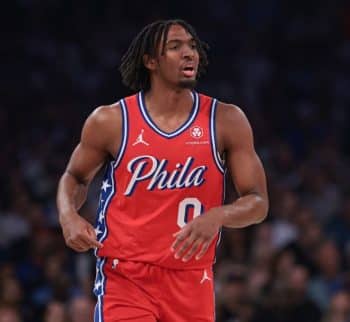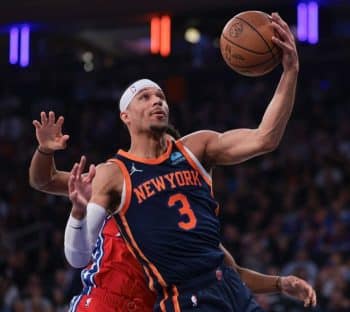NBA
NBA Daily: The Kyrie Trade One Year Later

Around this time a year ago, the Boston Celtics agreed to trade Isaiah Thomas, Jae Crowder, Ante Zizic, and Brooklyn’s unprotected first-rounder to the Cleveland Cavaliers for Kyrie Irving.
When this trade was announced, the first word that came to mind was rare.
First, it was rare to see such a significant move made that late in the off-season. August is usually the most boring month for the NBA because teams are usually set around that time and hence, no big-time moves are made. This trade made for quite the shuffle at the most unexpected time.
Second, it was rare to see a trade like this drag on as much as it did before completion. After the trade was initially reported, concern from Cleveland’s side over Thomas’ injured hip delayed the swap from being finalized for a week. Until Boston added a conditional second-rounder, there was legitimate concern that the deal was going to be nixed.
Third, and most importantly, it was rare to see two conference powers who had just faced off in the conference finals agree to exchange some of their best players when both were expected to be among the conference’s best for the upcoming season.
Since this trade became official, the public opinion has swayed back and forth on who won. Early on, Cleveland was believed to be the winner because of the haul they got for Kyrie. Taking two of Boston’s best players along with arguably its best asset for their disgruntled star impressed the masses since many believed Indiana and Chicago got a much weaker return for their disgruntled stars a few months earlier.
That all changed when Thomas and Crowder flopped badly in Cleveland, leading to them getting traded mid-season, along with the Nets pick not paying off as well as the Cavaliers had hoped. Kyrie, on the other hand, was doing Kyrie things in Boston. He razzled, he dazzled and proved he could be the leading man on a contender. That was until complications from his previous knee surgeries prematurely ended his season in March.
Strangely enough, when Cleveland and Boston faced off in the conference finals back in May, none of the players involved in the trade had any influence on the series.
Things have changed a lot since the season ended. Both Cleveland and Boston are now in very different situations. Boston is expected to be one of the league’s best teams behind a healthy Kyrie next season while Cleveland is expected to pick up the pieces following LeBron’s second departure.
So that leads to the oft-asked question as to who won this trade. Believe it or not, it’s actually more complicated than it may look, so it’s only fair to look at these teams’ current situations individually in the year since this deal was finalized.
Boston Celtics
On paper, this trade appears to be yet another in a long line of Danny Ainge fleece jobs. While Thomas and Crowder were shockingly awful fits in Cleveland, Kyrie put up his usual Kyrie-like statistics for Boston: 24.4 points, 5.2 assists, and 3.8 rebounds on a career-high 49 percent shooting from the field including 41 percent from distance are pretty much the numbers anyone would expect from Irving.
Sure his season ended much earlier than anyone in Boston would have wanted, but Kyrie performed admirably as the lead banana in Boston. He has both the talent and the experience to take Boston the distance. As exciting as it is to think of how far Irving can take the Celtics for the next decade, there are two lingering uncertainties that Boston will have to face in regards to Kyrie long-term.
A. His health: This season, Kyrie took time off to tend to a tension wire in his knee that was believed to keep him out for a few weeks. Tragedy struck a short while after when it was revealed he would go under a second procedure to remove the screws in his knee that he received after fracturing his kneecap in the 2015 NBA finals, ended his season. Boston management has assured that he should be ready to go and shouldn’t suffer any lingering effects. Still, Kyrie has shown himself to be injury-prone and even if the Celtics promise that his knee is fine, we don’t know how true that is until we see how he does this season.
B. His contract status: Kyrie seemed to be a happy man in Boston last season, but looks can be deceiving. If there’s some truth to these rumors that he wants to join forces with Jimmy Butler, then it won’t matter how happy he is in Boston. Kyrie smartly turned down the Celtics’ extension offer, given that he can make so much more next summer on the open market. The Celtics can offer him the most long-term security, which they might hesitate to do given his injury history.
What’s more telling is that the Clippers were in the same boat with Chris Paul in 2017, as were the Jazz with Gordon Hayward. It didn’t matter. The Celtics arguably offer a better winning situation than the former two did for their stars, but we’re in an age now where players are much more calculating about where they play than ever before. In the end, it may not matter what the Celtics can provide for Irving.
If Irving proves to be healthy and stays long-term, then the Celtics got what they wanted out of the Kyrie deal. That’s a big if, though.
Cleveland Cavaliers
Losing Kyrie is tough. Losing LeBron is tougher.
It’s true that the return that Cleveland got for Kyrie turned out to mostly be a bust, at least in regards to their veterans. Neither Thomas nor Crowder panned out, and George Hill, Larry Nance Jr. Rodney Hood and Jordan Clarkson weren’t much better. Still, Koby Altman deserves props for acquiring players that helped them in LeBron’s last year while also preparing themselves for the possibility of the King leaving, which is now a reality. The Cavs made the most out of a hazy situation between Kyrie’s trade demands and LeBron’s inevitable exit.
Not all is lost in Cleveland either. They have positioned themselves well financially now that they’re out of salary cap hell. They may still have to overpay players for the next two years like Clarkson and Tristan Thompson, but Hill, J.R. Smith, and Kyle Korver are all on partially guaranteed deals after this season. Should they waive them, then a lot of cap room opens up.
The X Factor to their future is Collin Sexton, who was most definitely the end game in the Kyrie Irving deal as the eventual selection with their valuable Nets pick. Sexton will have huge shoes to fill now that he enters the Land, but the returns so far are promising. Sexton looked every bit like the player the Cavs saw him when they took him in the draft, and his skills showed both on the court. Sexton’s athleticism, speed, and court vision made him a fantastic one-man show, as he averaged 19.6 points, 3.6 rebounds, and 3.4 assists on 43 percent shooting from the field.
Remember that Summer League performances should always be taken with a grain of salt. There have been players who have looked phenomenal in the Summer League that never made much of themselves in the pros, just like there have been legendary NBA players who struggled in Summer League. Still, Sexton’s performance should inspire some hope, which is hard to come by when you lose an all-timer like LeBron.
What matters most here is that unlike the first time LeBron left, Cleveland at least has some direction. No one knows whether Sexton is ready to contribute now or if that will come later, but at the very least, the Cavs have some young talent to build on.
If Sexton pans out the way Cleveland hopes he does, then they got what they wanted out of the Kyrie deal. That is also a big if.
For now, the question of who won the Kyrie Irving trade shall remain rhetorical. There’s no guarantee that Kyrie will be a long-term fixture in Boston just as there’s no guarantee that Sexton will live up to expectations in Cleveland.
When everything is written in stone, this trade may be the most comparable to the Pau Gasol trade to the Lakers in 2008. Many believed the Lakers practically stole Pau away from Memphis when they acquired him for Kwame Brown, Javaris Crittenton, Aaron McKie, two first-round picks, and the rights to Marc Gasol. However, while Pau helped the Lakers win two championships, a few years down the line, Marc became the centerpiece of the most glorious era of Grizzlies’ basketball.
What originally appeared to be a total rip-off eventually became a pretty even deal. That could be what the Irving for Sexton deal turns out to be, but only time will tell.
